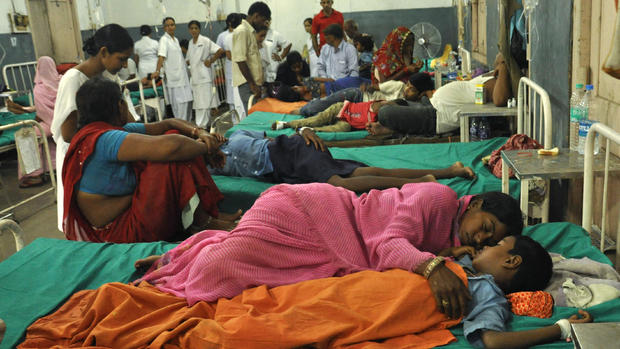Indian principal at school where 23 kids died arrested
PATNA, IndiaThe principal of a primary school in eastern India where 23 children died last week after eating lunch prepared with contaminated oil was arrested Wednesday, nine days after she went into hiding, police said.
Meena Kumari fled as soon as the children began falling ill after eating the lunch cooked at the school in Bihar state. Twenty-three children between the ages of 5 and 12 died after eating the meal and many others fell ill.
Forensic tests have revealed that the lunch contained toxic levels of a deadly pesticide.
A police team investigating the deaths arrested Kumari on Wednesday, and authorities were questioning her to establish how the pesticide got mixed with the food, said police superintendent Sujit Kumar.
- Report: Indian school lunches may have been cooked with pesticide
- India officials find container of pesticide in cooking area of school where 23 children died after eating tainted lunch
- Autopsies on India school children confirm 22 died from poisoning caused by insecticide in lunch
Bihar's education minister, P.K. Sahi, has said the principal bought the ingredients for the meal from a shop owned by her husband, who has fled.
The school's cooks have told authorities that the principal controlled the food for the government-provided free daily lunch.
One of the cooks said that the cooking oil appeared different than usual, but that the principal told her to use it anyway.
On Wednesday, Bihar's chief minister and top elected official, Nitish Kumar, said the government would punish all those who were responsible for the tragedy.
"No one will be spared," Kumar told reporters, adding that state authorities were working to streamline the school lunch program to prevent the recurrence of such a mishap.
India's midday meal plan is one of the world's biggest school nutrition programs. State governments have the freedom to decide on menus and timings of the meals, depending on local conditions and availability of food rations. It was first introduced in the 1960s in southern India, where it was seen as an incentive for poor parents to send their children to school.
Since then, the program has been replicated across the country, covering some 120 million schoolchildren. It's part of an effort to address concerns about malnutrition, which the government says nearly half of all Indian children suffer from.
Although there have been complaints about the quality of the food served and the lack of hygiene, the incident in Bihar appeared to be unprecedented for the massive food program.
